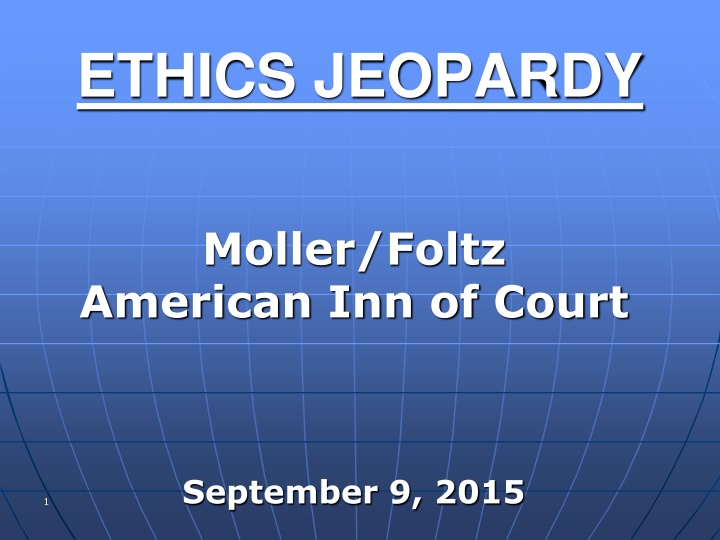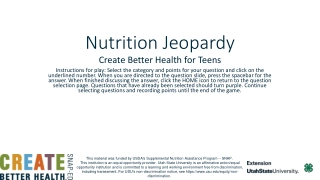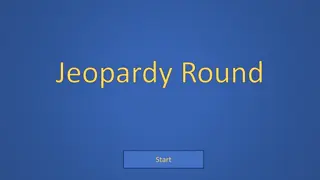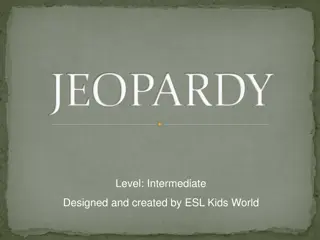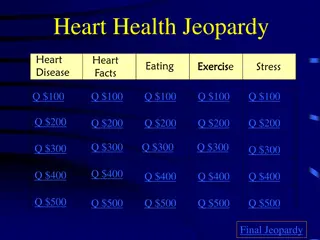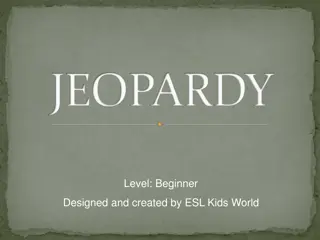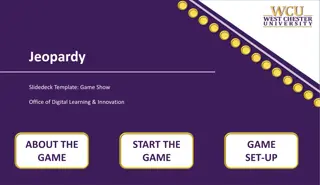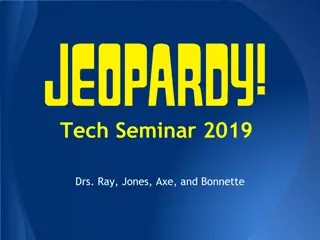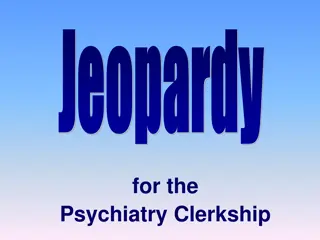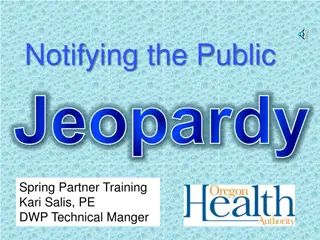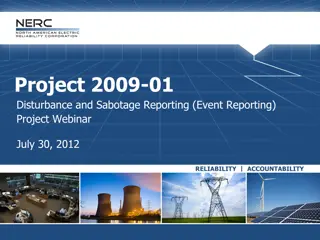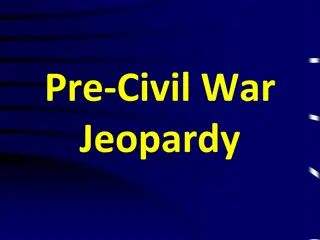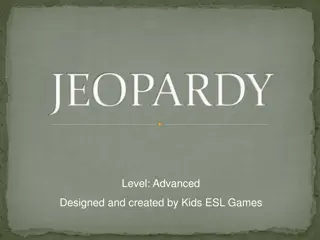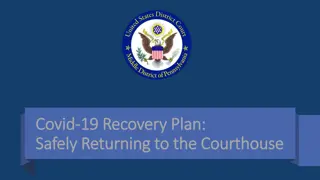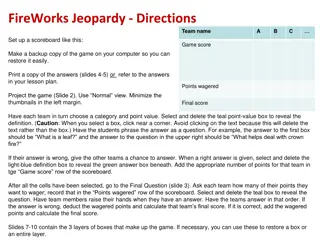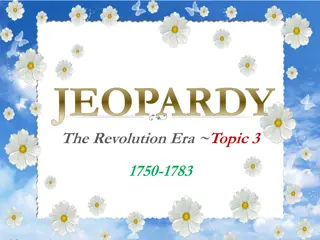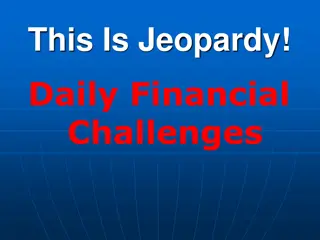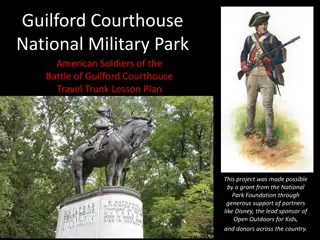Ethics Jeopardy: Courthouse Ethics Scenario
In this courthouse ethics scenario, a lawyer named Beta takes over an appeal case after their partner, Alpha, suffers a heart attack. During the oral argument, Beta makes a statement based on Alpha's brief without confirming its accuracy. The question arises whether Beta should face discipline for potentially making a false statement.
Download Presentation

Please find below an Image/Link to download the presentation.
The content on the website is provided AS IS for your information and personal use only. It may not be sold, licensed, or shared on other websites without obtaining consent from the author.If you encounter any issues during the download, it is possible that the publisher has removed the file from their server.
You are allowed to download the files provided on this website for personal or commercial use, subject to the condition that they are used lawfully. All files are the property of their respective owners.
The content on the website is provided AS IS for your information and personal use only. It may not be sold, licensed, or shared on other websites without obtaining consent from the author.
E N D
Presentation Transcript
ETHICS JEOPARDY Moller/Foltz American Inn of Court September 9, 2015 1
ETHICS JEOPARDY CLIENT LAWYER RELATIONS 5 Points COURTHOUSE ETHICS JUDICIAL CONDUCT CONFLICTS GRAB BAG 5 5 5 5 Points Points Points Points 10 10 10 10 10 Points Points Points Points Points 15 15 15 15 15 Points Points Points Points Points 20 20 20 20 20 Points Points Points Points Points 25 25 25 25 25 Points Points Points Points Points TOSS UP QUESTION 2 FINAL
COURTHOUSE ETHICS 5 POINTS Alpha, a partner in the law firm of Alpha & Beta, represents the plaintiff in an adversary proceeding. Alpha tried the case, and the court ruled in favor of the defendant. Alpha appealed. Alpha s brief stated, It is uncontroverted that Deft transferred the asset without fair consideration. In fact, Observant Accountant, defendant, testified that defendant paid a fair price for the asset. Alpha was aware of this testimony. a witness called by 4 Proceed to next slide
COURTHOUSE ETHICS 5 POINTS Three days before the appeal was scheduled to be argued, Alpha suffered a heart attack. Beta, Alpha s partner, undertook to argue the appeal. Beta knew nothing about the case and had no opportunity to confer with Alpha. In preparing for the argument, Beta read Alpha s brief thoroughly and read as much of the trial transcript as was possible in the limited time available, but did not read the testimony of Observant argument, Beta stated to the court, Your honors, as stated in our brief, it is uncontroverted that Defendant transferred the asset without fair consideration 5 Accountant. In oral Proceed to next slide
COURTHOUSE ETHICS 5 POINTS Is Beta subject to discipline for making this statement during oral argument? A. Yes, because the statement was false. B. Yes, because Beta did not know whether or not the statement was true but reasonably should have known it was false. C. No, because Beta did not know that the statement was false. D. No, because all Beta did not try the lawsuit. 6
COURTHOUSE ETHICS ANSWER 5 POINTS Answer: (C) No, because Beta did not know that the statement was false. DR 3.03 (a) A lawyer shall not knowingly: (1) make a false statement of material fact or law to a tribunal. (b) If a lawyer has offered material evidence and comes to know of its falsity, the lawyer shall make a good faith effort to persuade the client to authorize the lawyer to correct or withdraw the false evidence. unsuccessful, the lawyer shall take reasonable remedial measures, including disclosure of the true facts. If such efforts are 7
COURTHOUSE ETHICS 10 POINTS Following a bench trial with highly contested factual and legal issues, the court took the case under advisement. After two months, Helpful Attorney heard rumors that the Judge was having difficulty determining causation and was uncertain about the applicable law. Helpful Attorney telephoned the Judge, and asked if it would be helpful to hear additional evidence and then have briefing from both parties. Thereafter, Judge reopened the case for further testimony and requested supplementary briefs from both parties. 8 Proceed to next slide
COURTHOUSE ETHICS 10 POINTS Was it proper for the Attorney to communicate with Judge? Yes, because the Judge needed help. Yes, because the Attorney did not make any suggestion as to how Judge should decide the matter. No, because the Attorney orally communicated with Judge on a pending matter without adequate notice to opposing counsel. No, because the Attorney was forbidden from any communication, oral or written, with the Judge about any pending matter. A. B. C. D. 9
COURTHOUSE ETHICS ANSWER 10 POINTS Answer: (C). Rule 3.05(b). A lawyer shall not: (b) Except as otherwise permitted by law and not prohibited by applicable rules of practice or procedure, communicate or cause another to communicate ex parte with a tribunal for the purpose of influencing that entity or person concerning a pending matter other than: (2) in writing if he promptly delivers a copy of the writing to opposing counsel or the adverse party if he was not represented by a lawyer. (3) orally upon adequate notice to opposing counsel or to the adverse party if he is not represented by a lawyer. 10
COURTHOUSE ETHICS 15 POINTS ABC Co. has asked Lawyer Handy to represent the company in a lawsuit over a failed corporate merger. The defendant refused to complete the merger, claiming that ABC Co. failed to disclose material negative financial information about its business. Lawyer Handy was involved in some aspects of the underlying failed transaction. Lawyer Handy was physically present, with others, during merger negotiations when representatives of ABC Co. disclosed the financial information that the defendant now alleges it never received. Lawyer Handy was also copied on a follow-up email where the same representatives of ABC Co. sent copies of the financial information to the defendant. Does Lawyer Handy s first-hand knowledge prevent him from serving as an advocate for ABC Co. at trial? 11
COURTHOUSE ETHICS ANSWER 15 POINTS Answer: No. Rule 3.08(a). Lawyer as Witness A lawyer shall not accept or continue employment as an advocate before a tribunal in a contemplated or pending adjudicatory proceeding if the lawyer knows or believes that the lawyer is or may be a witness necessary to establish an essential fact on behalf of the lawyer's client, unless . . . . Here, there were other witnesses and the financial disclosure was made in writing. Lawyer Handy s testimony should not be necessary to establish that the disclosure was made. 12
COURTHOUSE ETHICS 20 POINTS Jimbo, who tries lots of cases in the Bankruptcy Court, invites Judge Lucky to join him for the Astros World Series game (Jimbo has great tickets). The Astros have made the World Series, again, and Judge Lucky is dying to go! Judge Lucky checks his docket, and confirms that Jimbo does not have any cases pending in his court. Judge Lucky can accept Jimbo s offer if ________? 13
COURTHOUSE ETHICS ANSWER 20 POINTS If Jimbo is not a party or person whose interests have come or are likely to come before the judge. Canon 4D(4)(c) of the Texas Code of Judicial Conduct. 14
COURTHOUSE ETHICS 25 POINTS If a lawyer has offered material evidence and comes to know of its falsity, what two steps must the lawyer take? ______________ and _____________. 15
COURTHOUSE ETHICS ANSWER 25 POINTS 1. Make a good faith effort to persuade the client to authorize correction or withdrawal of the evidence; and 2. If unsuccessful, take reasonable remedial measures including disclosure of the facts. Rule 3.03(b), Texas Rules of Professional Conduct 16
CLIENT/LAWYER RELATIONS 17
CLIENT/LAWYER RELATIONS 5 POINTS Texas attorney Spuds MacKenize has a practice in which he specializes solely in real estate law. For the past ten (10) years, MacKenize has represented Samuel Client as regards to Client s real estate holdings. MacKenize received a call from Client, who was in the Harris County jail. Client had been pulled over for speeding and a small amount of marijuana had been taken from the trunk of his car. Client asks MacKenize to represent Client in this matter and to expedite his release from jail. Since MacKenize does not practice in the area of criminal law, what are the two circumstances that would allow MacKenize to represent Client in this matter? 18
CLIENT/LAWYER RELATIONS ANSWER 5 POINTS 1. The advice or assistance of the lawyer is reasonably required in an emergency; and 2. He limits the advice and assistance to that which is reasonably necessary in the circumstances. Rule 1.01(a): A lawyer shall not accept or continue employment in a legal matter which the lawyer knows or should know is beyond the lawyer s competence, unless: (1) Another lawyer who is competent to handle the matter is, with prior informed consent of the client, associated in the matter; or (2) the advice or assistance of the lawyer is reasonably required in an emergency and the lawyer limits the advice and assistance to that which is reasonably necessary in the circumstances. 19 Proceed to next slide
CLIENT/LAWYER RELATIONS ANSWER 5 POINTS Cmt. 5: Paragraph (a)(2) permits a lawyer, however, to give advice or assistance in an emergency in a matter even though the lawyer does not have the skill ordinarily required if referral to or consultation with another lawyer would be impractical and if the assistance is limited to that which is reasonably necessary in the circumstances. 20
CLIENT/LAWYER RELATIONS 10 POINTS Under what circumstances may a lawyer enter into a business transaction with a client? 1. ______________. 2. ______________. 3. ______________. 21
CLIENT/LAWYER RELATIONS ANSWER 10 POINTS It must be established that the transaction and terms on which the lawyer acquires the interest are fair and reasonable to the client and are fully disclosed in a manner which can be reasonably understood by the client; 1. The client is given a reasonable opportunity to seek the advice of independent counsel in the transaction; and 2. The client consents in writing thereto. 3. Rule 1.08, Texas Disciplinary Rules of Professional Conduct. 22
CLIENT/LAWYER RELATIONS 15 POINTS Entrepreneurial Ed, a Texas lawyer, wants to provide a new service: For a fee, reviewing and providing advice concerning "self-help" forms prepared by pro se litigants in bankruptcy matters. Entrepreneurial Ed offers this service to Wynona, a country singer ready to declare bankruptcy. He proposes a written agreement which says no lawyer-client relationship is established and the scope of his services is only a review of, and advice concerning, the self help forms. May Ed (1) disavow the lawyer-client relationship and (2) limit his services? Yes or No? (1) ___________; and (2) ___________. 23
CLIENT/LAWYER RELATIONS ANSWER 15 POINTS 1. No. Ed cannot condition his advice upon Wynona disavowing the lawyer/client relationship. A lawyer is not permitted to advise, for a fee, a pro se litigant in a divorce or related family law matter concerning "self-help" forms prepared by the litigant if such services by the lawyer are conditioned on the litigant s signed agreement that that no lawyer-client relationship exists between the lawyer and the litigant. 2. Yes. Ed may limit his representation. A lawyer is permitted to limit by agreement the scope of his services in such cases to advice concerning the "self-help" forms. See Texas Ethics Opinion 635. 24
CLIENT/LAWYER RELATIONS 20 POINTS Attorney Knows Best and Stubborn Client disagree over whether Stubborn Client should accept a settlement offer. Attorney Knows Best explains that in her experienced legal opinion, the offer of settlement is better than anything Client will get at trial and strongly recommends that Stubborn Client accept the settlement. Trial is in two weeks and Stubborn Client says, Roll the dice, I don t care. What are Attorney Knows Best s options? 25 Proceed to next slide
CLIENT/LAWYER RELATIONS 20 POINTS Multiple Choice: A. Abide by a client s decision concerning whether to accept an offer of settlement. B. Seek to withdraw because the client is insisting upon pursuing an objective that the lawyer considers repugnant or imprudent or with which the lawyer has fundamental disagreement. C. Seek to withdraw because the representation will result in an unreasonable financial burden on the lawyer or has been rendered unreasonably difficult by the client. D. All of the above. 26
CLIENT/LAWYER RELATIONS ANSWER 20 POINTS Answer: D. All of the above. Rule 1.02, Scope and Objectives of Representation (a) Subject to paragraphs (b), (c), (d), and (e), (f), and (g), a lawyer shall abide by a client s decisions: (2) whether to accept an offer of settlement or a matter, except as otherwise authorized by law. 27 Proceed to next slide
CLIENT/LAWYER RELATIONS ANSWER 20 POINTS Withdrawal is allowed if: The client insists upon pursuing an objective that the lawyer considers imprudent or with which the lawyer has fundamental disagreement; or The representation unreasonable financial burden on the lawyer or has been rendered unreasonably difficult by the client repugnant or will result in an 28 Proceed to next slide
CLIENT/LAWYER RELATIONS ANSWER 20 POINTS Rule 1.15, Declining or Terminating Representation (b) Except as required by paragraph (a), a lawyer shall not withdraw from representing a client unless: (1) withdrawal can be accomplished without material adverse effect on the interests of the client; (2) the client persists in a course of action involving the lawyer's services that the lawyer reasonably believes may be criminal or fraudulent; (3) the client has used the lawyer's services to perpetrate a crime or fraud; 29
CLIENT/LAWYER RELATIONS 25 POINTS A lawyer failed to timely file a lawsuit on behalf of a client, resulting in the client s claim being barred by the statute of limitations. This was the only matter in which the lawyer was representing the client. The lawyer, recognizing the malpractice, wants to settle the malpractice claim directly with the client. What steps must the lawyer take prior to entering into a settlement agreement with the client? 30
CLIENT/LAWYER RELATIONS ANSWER 25 POINTS (1) Disclose the malpractice and the termination of the lawyer- client relationship to the client [1.06 (conflict of interest)], (2) Advise the now former client in writing that independent representation is appropriate with respect to the client's consideration of the lawyer's offer to settle the malpractice claim [TDRPC 1.08(g) (prohibited transactions)]; and (3) Not engage in conduct involving dishonesty, fraud, deceit or misrepresentation in connection with the negotiation and settlement of the malpractice claim [TDRPC 1.15(d) (termination of representation) 2.01 (advisor), 8.03(a)(4) (integrity)]. Texas Ethics Opinion 593 (February 2010). 31
JUDICIAL CONDUCT 5 POINTS Judge Fair is a well-known and highly respected judge. Her husband has recently decided to run for judicial office as well. Mr. Fair s campaign has designed advertisements in support of his bid and would like to include a family photo in several of the advertisements. Can Judge Fair appear in a family photo or image advertisements and be identified in the photo caption as the spouse of the candidate for office? in the political Yes or No? 33
JUDICIAL CONDUCT ANSWER 5 POINTS Answer: Yes. Judge Fair can appear in the family photo or image as long as she is identified by name, but not title. See Ethics Opinion No. 295 (2009). 34
JUDICIAL CONDUCT 10 POINTS A judge is sending text messages to a prosecutor during a jury trial and suggesting questions to ask so as to help secure a conviction of a defendant. This is: A. Okay, because the Judge is not the fact finder. B. Okay, because the Judge is only interested in the jury reaching a just and true result. Okay, because communication. C. Not it is an ex parte D. Not Okay, because it reflects bias or prejudice. 35
JUDICIAL CONDUCT ANSWER 10 POINTS Answer: (C) and (D). Canon 3 (5) A judge shall perform judicial duties without bias or prejudice. Canon 3 (8) A judge shall not initiate, permit or consider ex parte communications or other communications made to the judge outside the presence of the parties between the judge and a party, an attorney, a guardian or attorney ad litem, an alternative dispute resolution neutral, or any other court appointee concerning the merits of a pending or impending judicial proceeding. 36
JUDICIAL CONDUCT 15 POINTS What are the three limitations placed on a judge s ability to serve as an officer, director, or legal advisor to a civic or charitable organization? 37
JUDICIAL CONDUCT ANSWER 15 POINTS (1) engaged in proceedings that would ordinarily come before the judge or will be regularly or frequently engaged in adversary proceedings in any court. Not serve if it is likely that the organization will be (2) Not solicit funds. (3) Not give investment advice. 38 Proceed to next slide
JUDICIAL CONDUCT ANSWER 15 POINTS Canon 4, Conducting the Judge's Extra-Judicial Activities to Minimize the Risk of Conflict with Judicial Obligations C. A judge may serve as an officer, director, trustee or non-legal advisor of an educational, religious, charitable, fraternal, or civic organization not conducted for the profit of its members, subject to the following limitations: Civic or Charitable Activities. 39 Proceed to next slide
JUDICIAL CONDUCT ANSWER 15 POINTS (1) be engaged in proceedings that would ordinarily come before the judge or will be regularly or frequently engaged in adversary proceedings in any court. A judge should not serve if it is likely that the organization will (2) charitable, fraternal or civic organization, but may be listed as an officer, director, delegate, or trustee of such an organization, and may be a speaker or a guest of honor at an organization's fund raising events. A judge shall not solicit funds for any educational, religious, (3) A judge should not give investment advice to such an organization, but may serve on its board of directors or trustees even though it has the responsibility for approving investment decisions. 40
JUDICIAL CONDUCT 20 POINTS What four sources provide the standards to be applied to judicial disqualification in Texas? 41
JUDICIAL CONDUCT ANSWER 20 POINTS Texas Constitution; Texas Rules of Civil Procedure; Texas Code of Criminal Procedure; and Texas Code of Judicial Conduct. See In re: K.E.M.,89 S.W.3d 814 (Tex. App. Corpus Christi, 2002, no pet.) 42
JUDICIAL CONDUCT 25 POINTS A lawyer who is a candidate for judicial office shall comply with the applicable provisions of the Texas Code of Judicial Conduct. True or False? 43
JUDICIAL CONDUCT ANSWER 25 POINTS Answer: True. Tex. Disciplinary R. Prof l Conduct 8.02(b). 44
CONFLICTS 45
CONFLICTS 5 POINTS Melinda Darling represents a major oil and gas client in a high-profile environmental pollution case that has caught the attention of the media and politicians. A well-funded environmental protection group is filming a Netflix series based on the events at issue in the lawsuit and it paints the company in a very negative light. Darling strongly recommends that her client act aggressively to get its version of the story out there in the court of public opinion. Darling thinks that outsiders should be asked to push the story, because it may be less convincing coming directly from the Client. The Client agrees, and asks Darling to handle the publicity. The Cleint offers to sign over to Darling all rights to any literary or media rights based on the subject matter of the lawsuit. May Darling accept? 46
CONFLICTS ANSWER 5 POINTS Answer: No. Rule 1.08. Conflict of Interest: Prohibited Transactions (c) Prior to the conclusion of all aspects of the matter giving rise to the lawyer's employment, a lawyer shall not make or negotiate an agreement with a client, prospective client, or former client giving the lawyer literary or media rights to a portrayal or account based in substantial part on information relating to the representation. 47
CONFLICTS 10 POINTS While in law school, Jimmy Stewart worked as a law clerk for Pain and Fear, P.C. Stewart prepared research memos for the firm related to a lawsuit in which the firm represented the plaintiff, Start Up Co., against Established Tech. After graduation from law school and passing the bar examination, Jimmy Stewart began working as an associate for a second law firm, Dewey, Cheatem and Howe, P.C., which represents the defendant, Established Tech, in the lawsuit brought by Start Up Co. 48 Proceed to next slide
CONFLICTS 10 POINTS Once Dewey, Cheatem learns that Stewart worked for Pain and Fear during law school and was involved in the lawsuit against Established Cheatem continues to represent Established Tech but utilizes screening procedures to prevent Stewart from being involved in the representation of Established Tech and from sharing any confidential information concerning Start Up Co. with anyone in the firm. Start Up Co. and Pain and Fear have not waived their rights concerning information entrusted to Stewart who was only a young pup at the time he worked on the case. Tech, Dewey, 49 Proceed to next slide
CONFLICTS 10 POINTS Can Dewey, Cheatem screen Stewart from the case and continue their defense of Established Tech? Yes, because a law clerk is not a lawyer. Yes, because Dewey, Cheatem has screened Stewart from providing information. No, because the firm s representation of Established Tech reasonably appears limited by the law firm s obligations to another client. No, because Stewart personally represented Start Up Co. in another law firm. A. B. any confidential C. D. 50
